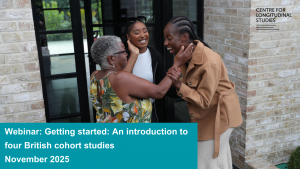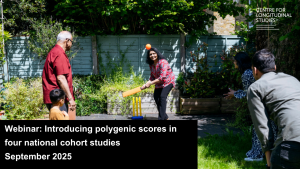
Emla Fitzsimons
Professor of Economics, CLS Director and Director of the Millennium Cohort Study
Email: E.Fitzsimons@ucl.ac.uk
On this page:
The Millennium Cohort Study (MCS) is a UK longitudinal birth study. It is following the lives of around 19,000 young people born across England, Scotland, Wales and Northern Ireland in 2000-02.
It has tracked measures such as physical, socio-emotional, cognitive and behavioural development, economic circumstances, parenting, relationships and family life across the life course.
MCS is core funded by the Economic and Social Research Council and a consortium of government departments.
MCS is known as Child of the New Century to participants and their families. If this is you, please visit the Child of the New Century website.
Introduction to the Millennium Cohort Study (2022)
This webinar gives first-time users and researchers less familiar with the Millennium Cohort Study an insight into this unique longitudinal cohort dataset born at the turn of the century.
Runtime 1:27:01
Unlike the previous three national birth cohorts, which all share the same birth week, MCS cohort members were born over a 17-month period (September 2000 – January 2002).
This allows researchers to investigate season of birth effects in children’s outcomes and trajectories.
The population from which every child should have a known, non-zero chance of selection was defined as all those:
The sampling strategy was to make a selection of areas of residence, and within them to recruit 100 per cent of the children born in the eligible period. The statistical geography available for such clusters in 2000-01 was the boundaries of electoral wards as they stood before updating at the 2001 Census.
Importantly, certain sub-groups of the population were intentionally over-sampled, namely children living in disadvantaged areas, children of ethnic minority backgrounds and children growing up in the smaller nations of the UK.
By the end of fieldwork for the Age 9-Months Sweep, 18,552 families had been interviewed, and the cohort included 18,818 children, allowing for 246 sets of twins and 10 sets of triplets. This represents a response rate of 72 per cent of all the families with eligible children living at nine months in the sampled wards.
The Age 3 Sweep in 2003-04 provided an opportunity to catch up with families who should have been in the Age 9-Months Sweep, but had been missed because they had only recently moved to an eligible address. This group of ‘new families’ was only recruited in England. The boost to the sample from the ‘new families’ brought the total of all families ever interviewed to 19,243 (and the number of children ever taking part up to 19,517).
There is no sample refreshment by immigrants. All the MCS children were resident in the UK at nine months, and would cease to be eligible if they leave the UK (but resume eligibility on return to the UK).
Data has been collected from resident fathers, including stepfathers, as well as from mothers at all sweeps.
For further details, read the MCS Technical Report on Sampling (2007).
Cohort profile
There are two MCS cohort profiles. The first one covers the period from 2001–2013.
Connelly, R. and Platt, L. (2014). ‘Cohort Profile: UK Millennium Cohort Study (MCS)’. International Journal of Epidemiology, volume 43, issue 6, p1719–1725, doi: 10.1093/ije/dyu001.
Cohort profile
The second cohort profile covers the period 2000-2012.
Joshi, H. and Fitzsimons, E. (2016). ‘The Millennium Cohort Study: the making of a multi-purpose resource for social science and policy’. Longitudinal and Life Course Studies, volume 7, issue 4, doi: /10.14301/llcs.v7i4.410.
Explore the data
Find a range of tools and resources to help you explore MCS data at each sweep.
Access the main survey data
Most MCS data are available for free via the UK Data Service [SN 2000031].
Access specialised data
Linked administrative records, genetic, geospatial and other specialised data are available from other public data repositories or directly from CLS.
Find code
Find R code for common data management tasks for MCS on our GitHub site.
CLS provides expert training for MCS data users of all experience levels. Check out all the webinars available on our YouTube channel.

Getting started: An introduction to four British cohort studies (2025)
New to the CLS cohort studies? This webinar recording will give you an overview of four internationally renowned national cohort studies and the wide range of opportunities they offer to researchers.
Runtime 1:19:59

Introducing polygenic scores in four national cohort studies (2025)
Discover the range of new polygenic scores available in the CLS cohort studies and find out what these data can be used for.
Runtime 41:31:00
Handling survey mode effects in the British cohort studies (2025)
This webinar considers the elements of mixed mode data collection in CLS' cohorts and helps researchers tackle the possible consequences of mode effects in their own analyses.
Runtime 1:19:33
Cognitive measures
MCS tracked cognitive development through early life and will continue to measure cognition through adulthood. Find out more in CLOSER’s guide to the cognitive measures in MCS and four other cohort studies.
Covid-19 surveys
Data are available from three surveys carried out during the pandemic with MCS and four other cohort studies.
Genetic data and biological samples
Genotyped data from over 7,500 MCS cohort members, obtained from biological samples collected at age 14, are available for research. Researchers can also access genotyped data from the parents of cohort members; over 7,500 mothers and 4,500 fathers.
Geospatial data
A range of geospatial data can be linked to MCS survey data using cohort members’ location information. Examples include data on local amenities, such as green space or fast food restaurants, and information on pollution and the weather.
Linked administrative data
Researchers can access administrative health and education data linked to MCS survey data. These include Hospital Episode Statistics, information from Scottish and Welsh health records, Ofsted reporting in England (2005-2019), National Pupil Database data for Key Stages 1, 2, 4 and 5 and school level data, Scottish pupil records for Key Stage 1, and Welsh pupil records for Key Stages 1-4.
In addition to the main MCS sweeps there have been a number of substudies:

Emla Fitzsimons
Professor of Economics, CLS Director and Director of the Millennium Cohort Study
Email: E.Fitzsimons@ucl.ac.uk
Emla is CLS Director and Director of the UK Millennium Cohort Study, a birth cohort study following children born at the turn of the new century. Her research is focused on the development of human capital throughout the life course, and in particular how experiences and circumstances in early life and childhood affect causally the acquisition of skills later on.